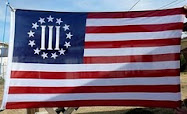 By Murray N. Rothbard
By Murray N. Rothbard[This article is excerpted from Conceived in Liberty, Volume IV, chapters 8 and 41.]
[Bust of George Washington (1732–1799) by Giuseppe Ceracchi (1751–1801)]
In June of 1775, George Washington was appointed Major General and elected by Congress to be commander in chief of the American revolutionary forces. Although he took up his tasks energetically, Washington accomplished nothing militarily for the remainder of the year and more, nor did he try. His only campaign in 1775 was internal rather than external; it was directed against the American army as he found it, and was designed to extirpate the spirit of liberty pervading this unusually individualistic and democratic army of militiamen. In short, Washington set out to transform a people's army, uniquely suited for a libertarian revolution, into another orthodox and despotically ruled statist force after the familiar European model.
His primary aim was to crush the individualistic and democratic spirit of the American forces. For one thing, the officers of the militia were elected by their own men, and the discipline of repeated elections kept the officers from forming an aristocratic ruling caste typical of European armies of the period. The officers often drew little more pay than their men, and there were no hierarchical distinctions of rank imposed between officers and men. As a consequence, officers could not enforce their wills coercively on the soldiery. This New England equality horrified Washington's conservative and highly aristocratic soul.
To introduce a hierarchy of ruling caste, Washington insisted on distinctive decorations of dress in accordance with minute gradations of rank. As one observer phrased it: "New lords, new laws. … The strictest government is taking place, and great distinction is made between officers and soldier. Everyone is made to know his place and keep it." Despite the great expense involved, he also tried to stamp out individuality in the army by forcing uniforms upon them; but the scarcity of cloth made this plan unfeasible.
At least as important as distinctions in decoration was the introduction of extensive inequality in pay. Led by Washington and the other aristocratic southern delegates, and over the objections of Massachusetts, the Congress insisted on fixing a pay scale for generals and other officers considerably higher than that of the rank and file.
In addition to imposing a web of hierarchy on the Continental Army, Washington crushed liberty within by replacing individual responsibility by iron despotism and coercion. Severe and brutal punishments were imposed upon those soldiers whose sense of altruism failed to override their instinct for self-preservation. Furloughs were curtailed and girlfriends of soldiers were expelled from camp; above all, lengthy floggings were introduced for all practices that Washington considered esthetically or morally offensive. He even had the temerity to urge Congress to raise the maximum number of strikes of the lash from 39 to the enormous number of 500; fortunately, Congress refused.
MORE HERE
























